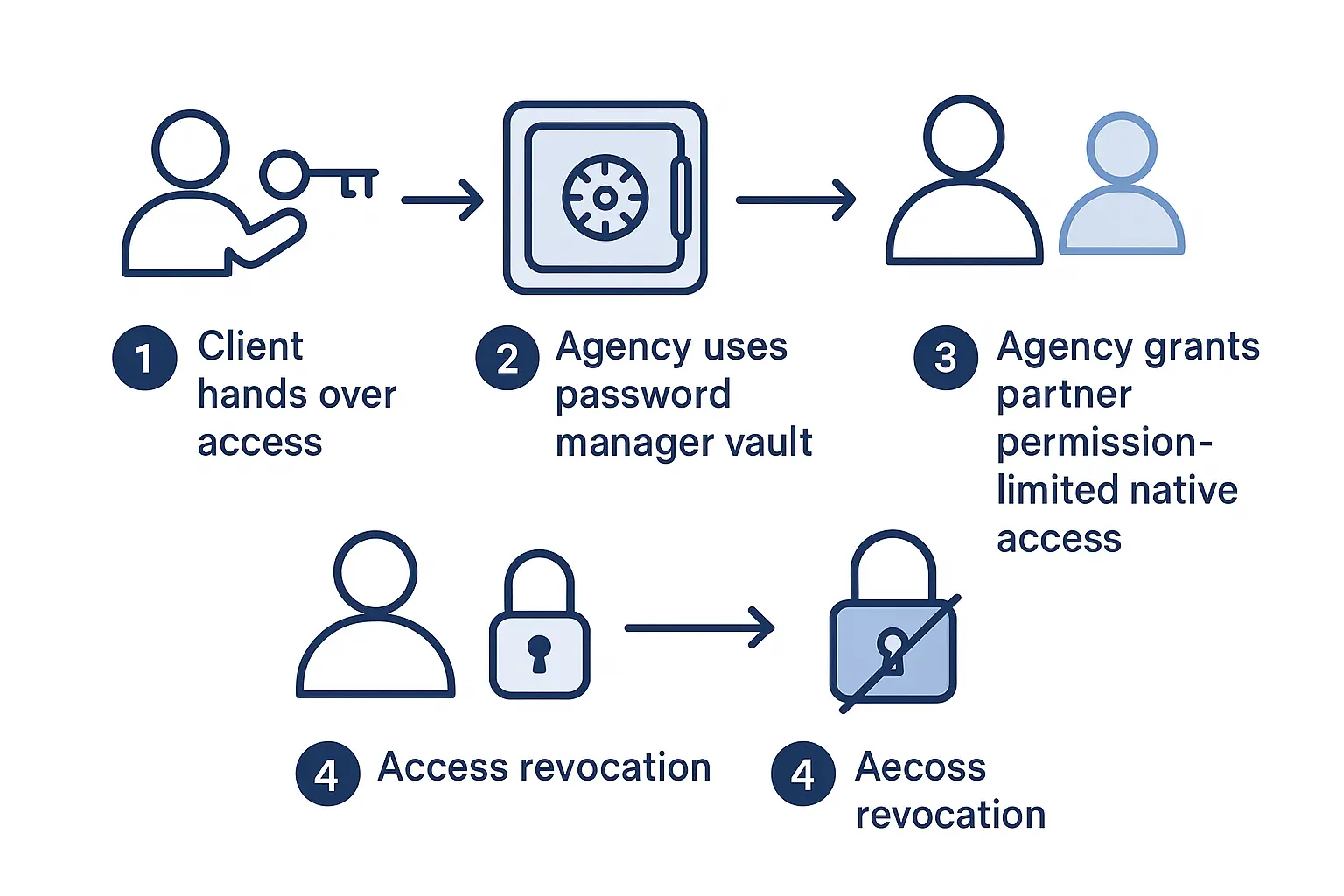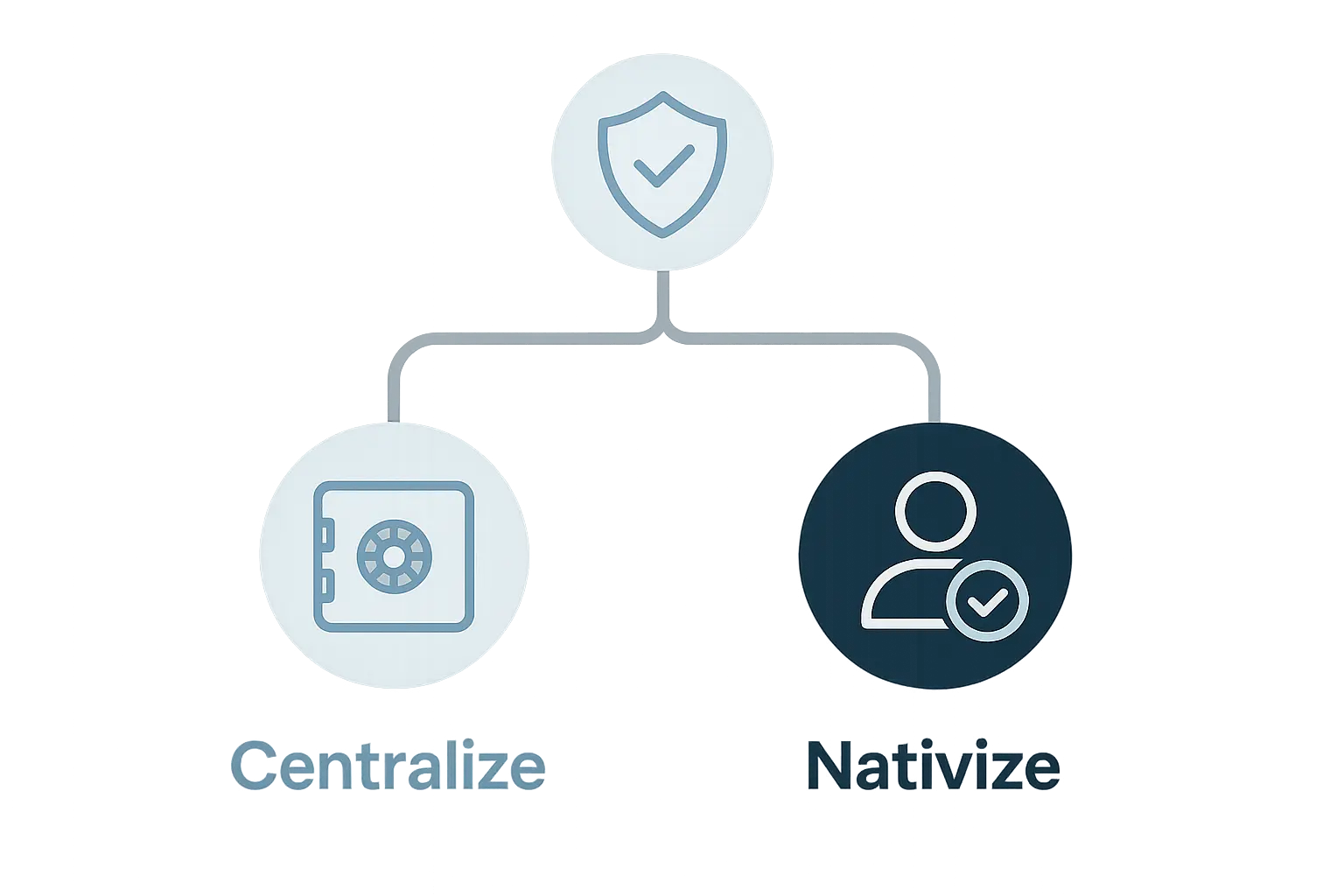You just landed a fantastic new client. The contract is signed, the kickoff call was a success, and your team is ready to dive in. Then comes the email you’ve sent a dozen times before:
“Hi [Client], we’re excited to get started! To begin our work, could you please send over the login details for your WordPress dashboard, Google Analytics, and Google Search Console? A simple list in an email or a shared doc works great.”
It feels routine, almost harmless. But that simple request, and the password-filled spreadsheet that often follows, is one of the biggest unmanaged risks in the agency world. It’s a ticking time bomb hiding in plain sight.
If that sounds dramatic, consider this: an estimated 45% of small and medium-sized businesses admit to having no cybersecurity plan in place. As their agency partner, their vulnerability quickly becomes your liability. This isn’t just about avoiding awkward conversations; it’s about protecting your clients, your reputation, and your bottom line.
Handing off client credentials to a partner, whether a freelancer or a white-label SEO team, can feel like a leap of faith. But it doesn’t have to be. By moving away from risky shortcuts and adopting professional security standards, you can turn a major vulnerability into a powerful demonstration of your agency’s expertise and trustworthiness.
Why “Good Enough” Is No Longer Good Enough
For years, agencies have relied on a patchwork of methods to manage client credentials: emails, sticky notes, and the infamous shared spreadsheet. While convenient, these methods are fundamentally flawed.
The core issue is human error. In fact, a staggering 82% of all data breaches involve a human element. A misplaced laptop, an email sent to the wrong address, or a weak password can be all it takes. The consequences are severe. The average cost of a data breach has now climbed to $4.45 million, a figure that can be catastrophic for an agency and its clients.
When you bring on a white-label SEO fulfillment partner, the number of people needing access increases, magnifying the risk if not managed correctly. The solution isn’t to avoid outsourcing; it’s to adopt the same secure, systematic approach that modern tech companies use.
The Two Pillars of Secure Credential Management
Forget the spreadsheets and email chains. True security for your agency and its partners rests on two core principles: centralized management and limited access.
1. The Power of Password Managers: Your Digital Vault
A password manager (like 1Password, LastPass, or Bitwarden) is a secure, encrypted application designed specifically to store and manage login credentials. Think of it as a bank vault for your digital keys. Instead of scattering sensitive information across insecure documents, everything is stored in one protected place.
Here’s why this is a game-changer for agencies:
-
Secure Sharing: You can share specific credentials with your white-label partner without ever revealing the actual password. They gain access through the password manager’s browser extension.
-
Centralized Control: If you need to revoke access, you can do it instantly from a central dashboard. No more hunting down old spreadsheets or asking people to delete files.
-
Audit Trails: You can see who accessed what and when, providing a clear line of accountability.
-
Strong Password Generation: Eliminate the “Password123!” problem by generating and storing unique, complex passwords for every single account.

2. The Principle of Least Privilege (PoLP)
This may sound technical, but the concept is simple and powerful: only grant the minimum level of access required for someone to do their job.
Imagine giving a painter a master key that opens every door in your home, including your office and personal safe. You wouldn’t. You’d give them a key to the front door and only the rooms they need to paint. PoLP applies that same logic to digital assets.
Your SEO partner doesn’t need full “Owner” access to your client’s Google Search Console to conduct an audit. They don’t need “Administrator” access in WordPress to optimize a blog post. By providing role-based access, you limit the potential damage if an account is ever compromised.
A Practical Playbook for Securely Onboarding Your SEO Partner
Putting these principles into action is easier than you think. Here’s a step-by-step guide to managing client access when working with a white-label partner.
Step 1: Set the Standard with a Password Manager
Before you share anything, your agency needs to adopt a password manager as its single source of truth.
-
Choose a Tool: Select a business-tier password manager. 1Password for Business and LastPass Teams are popular choices.
-
Create Client Vaults: Inside the manager, create a separate, dedicated “vault” or “folder” for each client.
-
Onboard Your Partner: Invite your white-label partner to a shared client vault. This gives them access only to the credentials within that specific vault, while you retain full control to add, edit, or revoke permissions at any time.
Step 2: Granting Google Search Console (GSC) & Analytics Access
Never ask for your client’s Google account password. Instead, have them grant access to your agency’s email address. You can then delegate that access to your partner.
For Google Search Console:
-
Full User: This role is perfect for an SEO partner. It allows them to use all features, like submitting sitemaps and disavow files, but they cannot add or remove other users.
-
Restricted User: This role has view-only rights, which is too limited for active SEO work.
-
Owner: This role should be reserved for the client and, in some cases, the primary agency contact. Never grant ownership to a third-party partner.
Step 3: Managing CMS Access (WordPress, Shopify, etc.)
Instead of sharing the main administrator login, create a new, dedicated user account for your partner within the client’s Content Management System (CMS).
In WordPress: Create a user with the “Editor” role. This allows them to create and edit content without being able to change plugins, themes, or core settings. If you use an SEO plugin like Yoast or Rank Math, you can use its built-in “SEO Manager” role for even more specific permissions.
In Shopify: Create a staff account and grant specific permissions related to “Themes,” “Blog Posts & Pages,” and “Navigation.” Uncheck permissions for sensitive areas like “Settings,” “Billing,” and “Apps.”
By creating separate user accounts, you get a clear audit trail of who made which changes, and you can delete the user instantly if the partnership ends.

Adopting this secure, professional framework does more than just protect you from risk. It sends a clear message to your clients that you take their security seriously. It’s the mark of a mature, trustworthy agency and a key step in scaling your business responsibly.
What to Demand from Your White-Label SEO Partner
Any fulfillment partner worth their salt will not only comply with these practices but insist on them. When vetting a potential partner, ask them directly about their security protocols:
-
Do you require the use of a password manager for all client credentials?
-
What is your standard operating procedure for requesting access to assets like GSC and WordPress?
-
Do you understand and operate on the Principle of Least Privilege?
-
What is your process for offboarding and ensuring all access is revoked when a project is complete?
A partner who can’t answer these questions confidently is a red flag. A great partner will view security as a shared responsibility and work with you to establish a secure foundation from day one. This commitment to process is a strong indicator of the quality you can expect in everything they do, including their SEO reporting and deliverables.
Frequently Asked Questions (FAQ)
1. What’s the best password manager for an agency?
For agencies collaborating with partners, business-focused plans from 1Password, LastPass, or Bitwarden are excellent choices. They offer features specifically for teams, like shared vaults, access controls, and administrative oversight, which are crucial for managing client data securely.
2. Is it truly safe to give a partner access to my client’s website?
Yes, as long as you do it correctly. By creating a separate user with limited permissions (like “Editor” in WordPress) and sharing credentials via a secure password manager, you minimize risk. You retain full control to monitor their activity and can revoke access instantly without affecting any other part of the site.
3. What if an employee at the partner agency leaves?
This is exactly why professional security protocols are so important. A reputable white-label partner will have an internal offboarding process that immediately revokes a former employee’s access to all systems, including your shared password manager vaults. Because you grant access instead of sharing passwords, there’s no lingering risk of a credential falling into the wrong hands.
4. How do I explain this new, more secure process to my clients?
Frame it as a benefit and a mark of professionalism. You can say something like: “To ensure the highest level of security for your digital assets, we manage all credentials through an encrypted password manager and use permission-based access. This means we’ll request that you add us as a user rather than sharing your main login. It’s an industry best practice that protects us both.” Most clients will be impressed, not inconvenienced.
Security Is the Foundation of Scale
Moving away from the password spreadsheet isn’t just about avoiding disaster; it’s about building a more professional, scalable, and resilient agency. When your operational foundation is secure, you can confidently take on more clients and deepen your partnerships, knowing you’re protecting everyone involved.
By implementing these best practices, you forge a chain of trust that runs from your client, through your agency, and to your fulfillment partners. This is how modern agencies build for growth.


